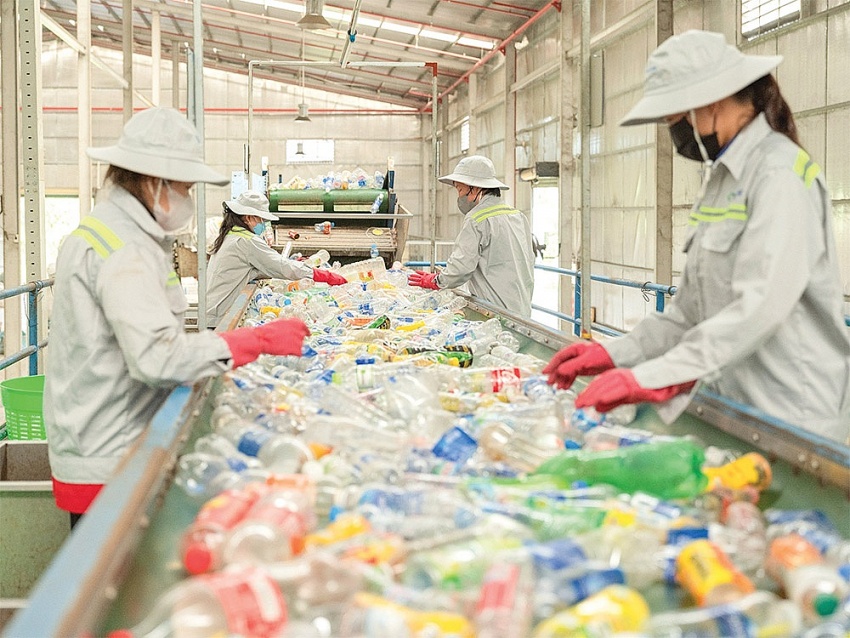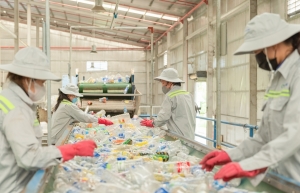Businesses press for EPR guidelines
 |
| Foreign businesses expect policies and incentives when it comes to using plastic and recycling |
The implementation of the Law on Environmental Protection, which includes guidance on extended producer responsibility (EPR), is still waiting to be approved.
According to the Ministry of Natural Resources and Environment (MoNRE), March 31 was the registration deadline for the EPR portal, and April 20 is the deadline for contributions to the Vietnam Environment Protection Fund. Yet, uncertainties remain about the fee calculation, particularly concerning product and packaging recycling costs, making budgeting difficult for businesses.
According to the Japan Chamber of Commerce and Industry in Vietnam (JCCI), outlines for the circular economy and the development of detailed implementation guidance on EPR are required.
“As EPR has been gradually applied since January, it is a concern if the burden of waste recycling costs will be unilaterally imposed only on producers and importers, which will lead to an increase in production costs and thus decrease international competitiveness,” said Muto Shiro, vice chairman of the JCCI, at the Vietnam Business Forum last month.
“We believe that the regulations and detailed implementation guidelines are necessary for companies to fulfil their EPR. We have heard that even high compliance and conscious companies may not know how to respond to comply with the law because, for example, the method of recycling lubricants, the method of calculating recycling results, and the scope of responsibility are unclear.”
Unilever Vietnam chairwoman Nguyen Thi Bich Van said, “EPR should be implemented when the local recycling industry and the market for recycled materials are ready because then it can fulfil its mission of promoting a circular economy. On the contrary, it can create a financial burden for businesses when it takes effect at the wrong time.”
The policy framework should be flexible, encouraging new initiatives and approaches but not limited to initiatives by businesses, social enterprises, or reinvestment of government funds in waste collecting and treatment, Van added.
The business community in various chambers of commerce, as well as domestic producers, expect related policy to have incentive solutions for those using PCR plastic in packaging, creating incentives for businesses to invest in reducing the use and recycling of plastic.
Many producers are also concerned that under this framework, fees charged to producers exceed the recycling system’s capacity, risking higher prices for consumers. As a solution, they propose a two-year, penalty-free gradual EPR implementation period from 2024 to prevent business overload while balancing economic and environmental goals. Additionally, transparency in managing the Vietnam Environment Protection Fund is vital, with open disclosure of allocations for recycling and technological advancements.
Starting from January 1, EPR requires producers and importers of electronic products, lubricants, and various types of packaging must either recycle or pay fees to support waste recycling activities.
Producers and importers of electrical and electronic products shall implement recycling responsibilities from 2025, while producers and importers of vehicles shall implement recycling responsibilities from 2027.
Due to the concerns of producers and importers, the MoNRE has organised training courses. Going forward, a circular will be approved on the management of contributions paid by producers and importers into the environmental protection fund to support waste recycling and treatment.
“In February, the National EPR Council was established, which is a cross-sectoral cooperative organisation assisting the management, supervision, and implementation of EPR for recycling products and packages as well as treating waste,” said Nguyen Thi, senior legal expert at the Department of Legal Affairs under the MoNRE.
“Once the circular is approved, we can use a part of the budget to recruit the official staff, who will support explaining the questions from producers and importers during the process of declaration and implementation of the EPR.”
 | EPR can be a move towards sustainable development By implementing extended producer responsibility, Vietnamese businesses can meet the increasingly high demands of partners and participate extensively in the global value chain, but it is also a challenge because new regulations always take time to deploy and enforce effectively. |
 | Norway stands ready to collaborate with Vietnam in EPR policy and practices Vietnam is applying regulations on extended producer responsibility to its production industries. Deputy head of mission from the Norwegian Embassy in Vietnam, Mette Moglestue, talked with VIR’s Hoang Oanh about the experiences of her country in effectively implementing such regulations as well as the opportunities for cooperation with Vietnam. |
What the stars mean:
★ Poor ★ ★ Promising ★★★ Good ★★★★ Very good ★★★★★ Exceptional
Related Contents
Latest News
More News
- Masan Consumer names new deputy CEO to drive foods and beverages growth (February 23, 2026 | 20:52)
- Myriad risks ahead, but ones Vietnam can confront (February 20, 2026 | 15:02)
- Vietnam making the leap into AI and semiconductors (February 20, 2026 | 09:37)
- Funding must be activated for semiconductor success (February 20, 2026 | 09:20)
- Resilience as new benchmark for smarter infrastructure (February 19, 2026 | 20:35)
- A golden time to shine within ASEAN (February 19, 2026 | 20:22)
- Vietnam’s pivotal year for advancing sustainability (February 19, 2026 | 08:44)
- Strengthening the core role of industry and trade (February 19, 2026 | 08:35)
- Future orientations for healthcare improvements (February 19, 2026 | 08:29)
- Infrastructure orientations suitable for a new chapter (February 19, 2026 | 08:15)

 Tag:
Tag:


















 Mobile Version
Mobile Version